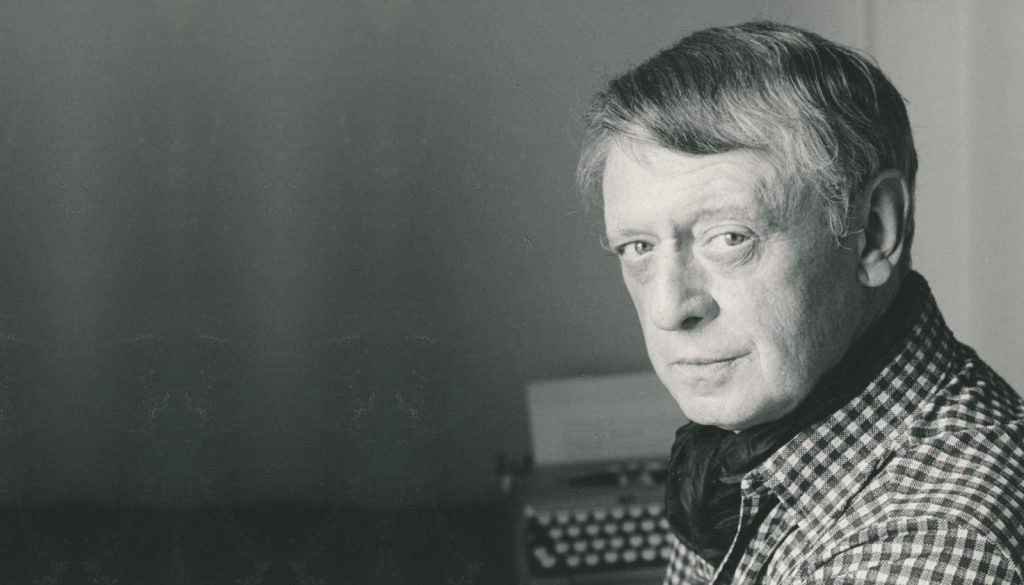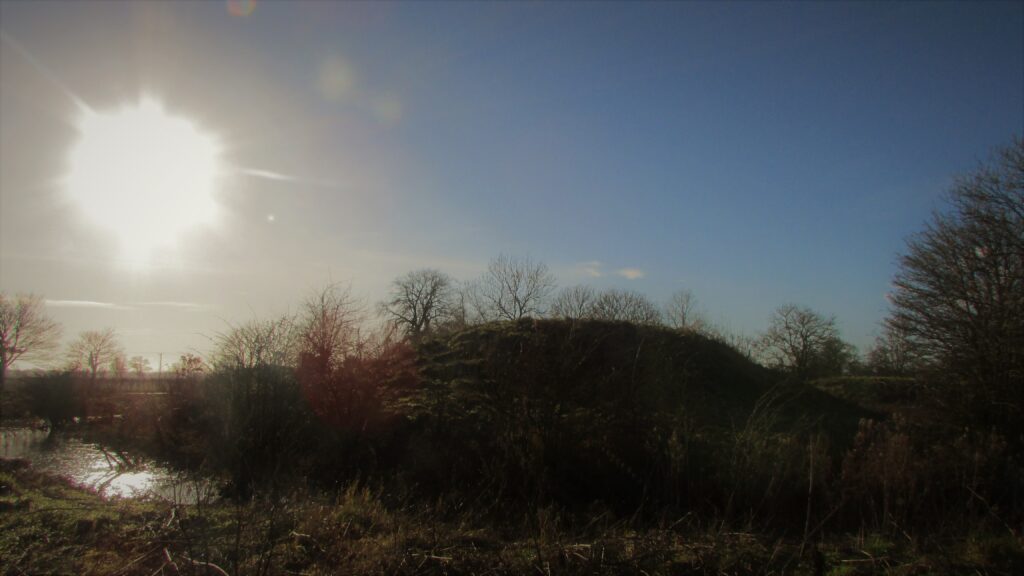
BENJAMIN AFER outlines an extraordinarily prolific and versatile author
Some weeks ago, I was offered a small commission by a respectable new journal to contribute a few thousand words on Marcel Proust’s À la recherche du temps perdu, but reluctantly deferred owing to considerable concern that a short essay composed under the duress of manic end-of-year busyness would result an inadequate treatment of such a monumental work. But when I was offered some column inches in this journal on the subject of Anthony Burgess, I accepted without hesitation. After all, Burgess has long been one of my most-admired authors, and I have more than a casual familiarity with his work, having read and re-read a good deal of his fiction many times over.
This cheerful attitude quickly fell into a tense anxiety when I realised, sitting down to write, that the great scope of Burgess’s œuvre would make this a more complicated and technically demanding matter than any essay on Proust. For even if Marcel still has Anthony pipped on word-count (and that’s not entirely certain), the latter’s ability to write masterful works in so many genres, in so many different styles, on endlessly varying subjects, in both fiction, non-fiction, symphonic music and poetry means that there is ample material for several lifetimes worth of Burgess-study. Both authors can be poked in the ribs, so to speak, with that infamous jibe given by a member of the royal family upon the presentation of yet another volume of Decline and Fall – “Another damn’d thick, square book! Always scribble, scribble, scribble! Eh, Mr. Gibbon?”
Even Burgess’s socially mobile origin story is so uniquely mid-century that it requires hefty contextual explanation, and the subsequent biographical aspects seem to go on twisting and turning forever. We have Burgess the precocious Catholic schoolboy, Burgess the soldier, Burgess the lover, Burgess the adulterous scoundrel, Burgess the schoolmaster, Burgess the august television intellectual, Burgess the tax-dodging expatriate, Burgess the linguist, Burgess the Joyce expert, Burgess the librettist, Burgess the avant-garde composer, satirist and poet. At least Proust remained mercifully confined to his bed, doing little else but huffing Escouflaire [Ed. Anti-asthmatic medicines] and “scribble, scribble scribble.”
Indeed, this systematic under-appreciation of Anthony Burgess seems to be less a consequence of any mediocrity on his part and more a consequence of sheer befuddlement on the part of lazy critics, academics, and other taste-making ne’er-do-wells. There is no adjectival hole into which the man or his work can be easily pigeoned. As G.K. Chesterton said of the Christian ideal, Burgess has not been tried and found wanting. He has been found difficult, and left untried.
John Burgess Wilson (later confirmed into the Catholic Church with the middle name Anthony) was born in Manchester, in February 1917. His mother, Elizabeth Burgess, died less than two years later of the Spanish Flu, and his father Joseph took up with Margaret Dwyer, the landlady of the pub in which he played the piano as an evening job. Though Joseph Wilson was by trade a shopkeeper dealing mainly in tobacco and alcohol (which kept the family out of poverty during the long depression years – “the poor always found money to drink”) Burgess always recalled his father as a frustrated composer, skilled enough to play all the favourite pub tunes and provide spontaneous accompaniment to silent films in the local picture house, but otherwise an archetypical mute inglorious. His self-description was always that of a composer who wrote books rather than a writer who dabbled in music.
Despite his father’s apparent gifts, Burgess remained ignorant to music as a whole until hearing a prelude by Debussy on his home-built radio. The attitude among lower-middle class Mancunians of the interwar years, both at home and at the Xaverian College to which the bookish young man had earned a scholarship, held against teaching music to young people – there was no realistic prospect of any money in it – so, undeterred and with characteristic bullheadedness, Burgess taught himself to play the piano at the age of 14.
Moreso than the solitariness of his schoolyears and the often-warlike relationship between himself and his stepmother (later given brilliantly repulsive illustration in the Enderby novels), Burgess was always quick to recall the Catholic, and particularly Irish, aspect of his background. At least one journalist joked that to hear Burgess talk of his home city, one would suppose that Manchester was a suburb of Dublin. With echoes of the late-century “Troubles literature” that familiarised many British and American readers with the largely self-generated Cagot-apartheid between denominations in Northern Ireland, Burgess recalled in print and on television interviews the automatic jeering and separation between “Cat-licks” and “Proddy-dogs” in Jazz Age Manchester, long before the children on either side of the dispute had any rational grounds to do so. Burgess’s father often took him aside and cautioned “Son, don’t give allegiance to any Hanoverian Protestant monarch. Your last monarch was James II.” It was taken both as a sort of nostalgic joke and as a deadly serious reminder of where the lines lay in the Britain of that era.
Once again hobbled in his ambitions to become a composer when the music department at Victoria University [Ed. Now part of the University of Manchester] turned down his application, he was instead taken in by the literature department in 1937, and a female economics student called Llewela “Lynne” Isherwood. Burgess was able to finish his degree before the inevitable call-up for National Service.
To put it plainly, the army did not suit him. He was constantly being arraigned for disciplinary offences and, most commonly, for overstaying his married leave. Despite his best efforts, the army promoted him to sergeant and found a place for him in the Educational Corps. Burgess’s flair for language earned him a posting in Gibraltar, working as a debriefer on behalf of stranded Dutch and French expatriates. A brief lock-up on the other side of Spanish border following an ill-advised tirade on the diminutive height and not-so-diminutive portliness of General Franco would be given its vicious counterpoint in an incident made famous by a disturbing quasi-literation in A Clockwork Orange: Lynne, still back in England and pregnant with the Burgess’s first child, was beaten and raped by a gang of marauding American deserters under the cover of the blackout, losing the baby as a consequence. Burgess, for reasons unknown, was denied home leave to see her. The horrifying inability to protect his wife or even comprehend the reasons for such an act seems to have given succour to Burgess’s mystical-Catholic belief in the existence of a pure evil that stalks out potential in every human being. Try to find any trace of rational-choice doctrine or liberal social-excuse theory in the following passage:
All right, Dim,’ I said. ‘Now for the other veshch, Bog help us all.’ So he did the strong-man on the devotchka, who was still creech creech creeching away in very horrorshow four-in-a-bar, locking her rookers from the back, while I ripped away at this and that and the other, the others going haw haw haw still, and real good horrorshow groodies they were that then exhibited their pink glazzies, O my brothers, while I untrussed and got ready for the plunge. Plunging, I could slooshy cries of agony and this writer bleeding veck that Georgie and Pete held on to nearly got loose howling bezoomny with the filthiest of slovos that I already knew and others he was making up. Then after me it was right old Dim should have his turn, which he did in a beasty snorty howly sort of a way with his Peebee Shelley maskie taking no notice, while I held on to her. Then there was a changeover, Dim and me grabbing the slobbering writer veck who was past struggling really, only just coming out with slack sort of slovos like he was in the land in a milk plus bar, and Pete and Georgie had theirs.
These are not horrors to be explained away by some bunk about absentee fathers or inadequate youth-group opportunities. The bucking refutation of modern sociological ideas in A Clockwork Orange is, in my view, the true cause of the furore later kicked up around the hitherto modestly known book when the Stanley Kubrick film appeared. As Burgess himself noted, the Russell-esque socially liberal literati, who normally kept their safe, snobbish distance from those poor working-class underdogs whom they supposedly championed, took great personal offence at the character of Alex – an obviously intelligent, strategically minded-young man with two loving parents and an orgasmic appreciation for “lovely Ludwig van.” They were forced to see, not as they usually did a violent, irrational sub-species in need of a good Pygmalion-job, but instead a character they themselves identified with.
A Clockwork Orange takes the territory explored by Dostoyevsky via Raskolnikov to a logical end by removing even the pretence of a reason for what Alex does. Unlike the would-be Übermensch Raskolnikov, there are no delusions of grandeur to Alex. His material needs are well-satisfied, and he delights in the pleasure of violence itself rather than violence as a means to an end like robbery or survival. He indulges in evil acts more or less for their own sake. He knows the difference between right and wrong, but simply fails to consider why such a contrast should impede him. More chillingly to the modern progressive mind, Burgess takes a firm stand on the human necessity that Alex be able to choose to live in such a way. A further insult is levelled at the intelligentsia by the way in which their “Ludovico Treatment” gives us a stronger feeling of nausea and repulsion than any of the crimes committed by young Alex, because the former is a hideous restriction on any moral choice that renders the victim an eponymous clockwork orange – only superficially organic and alive. By contrast, the ultra-violence and juvenile thuggery of the Droogs is all-too-human. Their lives are an expression of forces that cannot be created or destroyed; merely redirected; a fact so wonderfully illustrated by Burgess when a wretched, suffering, “reformed” Alex is torturously worked over by two policemen, whom he suddenly recognises as former members of his gang.
Although A Clockwork Orange is the title most people will conjure in their minds when they hear the author’s name, for Burgess, the success and media frenzy around the book became a case-study in the ancient artist’s headache: the inability to choose which of your works becomes a public ‘favourite.’ Though the creation of Alex’s “Nadsat” argot is a deservedly acclaimed feat, Burgess was always quick to point out that he considered the work a minor one of his own canon, a jeu d’esprit knocked off in a couple of weeks. From the release of the film to his last days, he was continually badgered by obnoxious phone calls from tabloid papers and crusading members of the public asking if he felt personally responsible for that week’s nondescript heinous act of violence, particularly if the act in question involved sexual extremism.
But Burgess, ever our dogged professional, was never one to pass up the opportunity to turn a unique life experience into fine prose. Picture a corpulent, dyspeptic middle-aged English poet-cum-lecturer staggering around a New York apartment borrowed from some ten-a-penny feminist academic on sabbatical. He’s naked. He’s staggering towards a telephone which, when answered, usually delivers a barrage of ranting phone calls from angry citizens who are eager to denounce him for what began as a film adaption of Hopkins’ poem The Wreck of the Deutschland, which has evolved to become a salacious piece of exploitation. The poor chap did not produce, write, or contribute to the project in any meaningful sense, but nevertheless his name has appeared all over the credits. A talk show has phoned asking him for an appearance that night:
[…] Some boys have been attacking some nuns. In Manhattanville. I’m shocked you didn’t know. I assumed–
“Nuns are always being attacked. Their purity is an affront to the dirty world.”
“Remember that. Remember to say that. But the point is that they said they wouldn’t have done it if they hadn’t seen the movie. That’s why we’re—”
I see. I see. Always blame art, eh? Not original sin but art. I’ll have my say, never fear.”
“You have the address?”
“You ignore art as so much unnecessary garbage or you blame it for your own crimes. That’s the way of it. I’ll get the bastards, all of them. I’m not having this sort of nonsense, do you hear?” There was silence at the other end. “You never take art for what it is – beauty, ultimate meaning, form for its own sake, self-subsisting, oh no. It’s always got to be either sneered at or attacked as evil. I’ll have my bloody say. What’s the name of the show again?” But she had rung off, silly bitch.
Enderby went snorting back to his poem. The stupid bastards.
Enter Francis Xavier Enderby. On the back cover of my copy of the excellent Vintage Classics edition of ‘The Complete Enderby,’ is a snippet of praise from Gore Vidal, who pronounces the Enderby series to be “even finer comedies than those by Evelyn Waugh.” I cannot really disagree with this, devotee of Messrs Pennyfeather and Boot though I am, but my first point of comparison would not be to anything by Waugh, but rather to the borborygmically-challenged elephantine Catholic Ignatius J. Reilly in John Kennedy Toole’s A Confederacy of Dunces.
The Enderby novels (Inside Mr Enderby, Enderby Outside, The Clockwork Testament and Enderby’s Dark Lady) belong to that august class of comedic books which can be called, without hyperbole or cliche, achingly funny. Concerning the declines and falls of a minor poet who writes in his filthy lavatory and lives off a small annuity left him by his detested stepmother (Burgess leaves little speculation room for biographical critics), Enderby appears to us as a kind of innocent shrew of self-supported masculinity, unsociable and fragile as he may be. His livings, though squalid, are secure, and his muse is to be reliably found in the WC whenever he wishes to call upon her. Any aspiring writer or artist will know what a screamingly enviable position this is to be in.
But alas, the forces of polite society, modernity, Ludovico-toting medical-establishment quacks and (shudder) females and marriage all conspire to destroy what precious little Enderby has in life. Like any master of the picaresque, Burgess knew that the plot is wholly superficial; what keeps the humour alive and glowing is the flavour of each situation the protagonist finds themselves in, and how they go about the inevitable extrication into the next one. Enderby’s numerous literary and menial vocations, alternate personalities, disconcerting love interests, expatriate nationalities and endless personal problems are navigated deftly enough by Burgess, though with a little slowing and self-indulgence at various points.
It feels a little wrong to reserve so little space for the “serious” masterpieces. Like everything Burgess wrote other than A Clockwork Orange, the major novels remain ignored and little-read. Napoleon Symphony is a controversial, rather Freudian portrait of l’Empereur composed along the lines of Beethoven’s Third Symphony, which in itself might be the only work of art famous for who it isn’t dedicated to. Earthly Powers deserves its own treatment entirely, but suffice to say it is a heroic send-up of a man Burgess fervently envied for his wealth and literary celebrity – the repressed homosexual author, intelligence agent and fellow Riviera-expatriate W Somerset Maugham. Christopher Hitchens pointed out that the novel’s famous first line (“It was the afternoon of my eighty-first birthday, and I was in bed with my catamite when Ali announced that the archbishop had come to see me.”) is such savagely accurate parody because it is so much better than anything “poor old Willie” ever wrote in his life.
There is so much more to Burgess than can be covered in a small essay such as this. He began his career, for example, with the superb Malayan trilogy, concocted when he was a colonial civil servant in the 1950s with a terminal diagnosis (obviously proved to be wrong) and a moody, alcoholic wife to support as best he could. The switch from “John Burgess Wilson” to “Anthony Burgess” was to accommodate the fact that in those days, it simply wasn’t on for respectable government men to write funny novels. But Burgess knew which career beckoned most.
What I admire most about him was the sheer professionalism he brought to the craft of writing. There is nothing bohemian or “artsy” or, God forbid, “Bloomsbury” about his character or life. This is borne out in his habits – come rain, come shine, come hangover, he would swing his way to the writing room at nine o’clock each morning to set down his 2,000 words. Other writers chided him for this (“written your weekly novel yet, Burgess?”) but this was so obviously spurred by shame and jealously. There really never is any excuse for the loose manner in which so many scribblers comport themselves; writing is not some gentlemanly pastime but a profession, with all the great and grim caveats that label entails. When encouraged by his publishers to try a word processor, Burgess rejected it not for any romantic attachment to typewriters or pen-and-ink, but because the keys could be pressed all to easily – “the slam of key against platen is like the hammer to the anvil, you can hear that work is being done.” Ite, missa est, Mr Burgess.
BENJAMIN AFER is a British poet and essayist. His X/Twitter account is @VersebyHat, and his YouTube channel is “Panama Hat”

